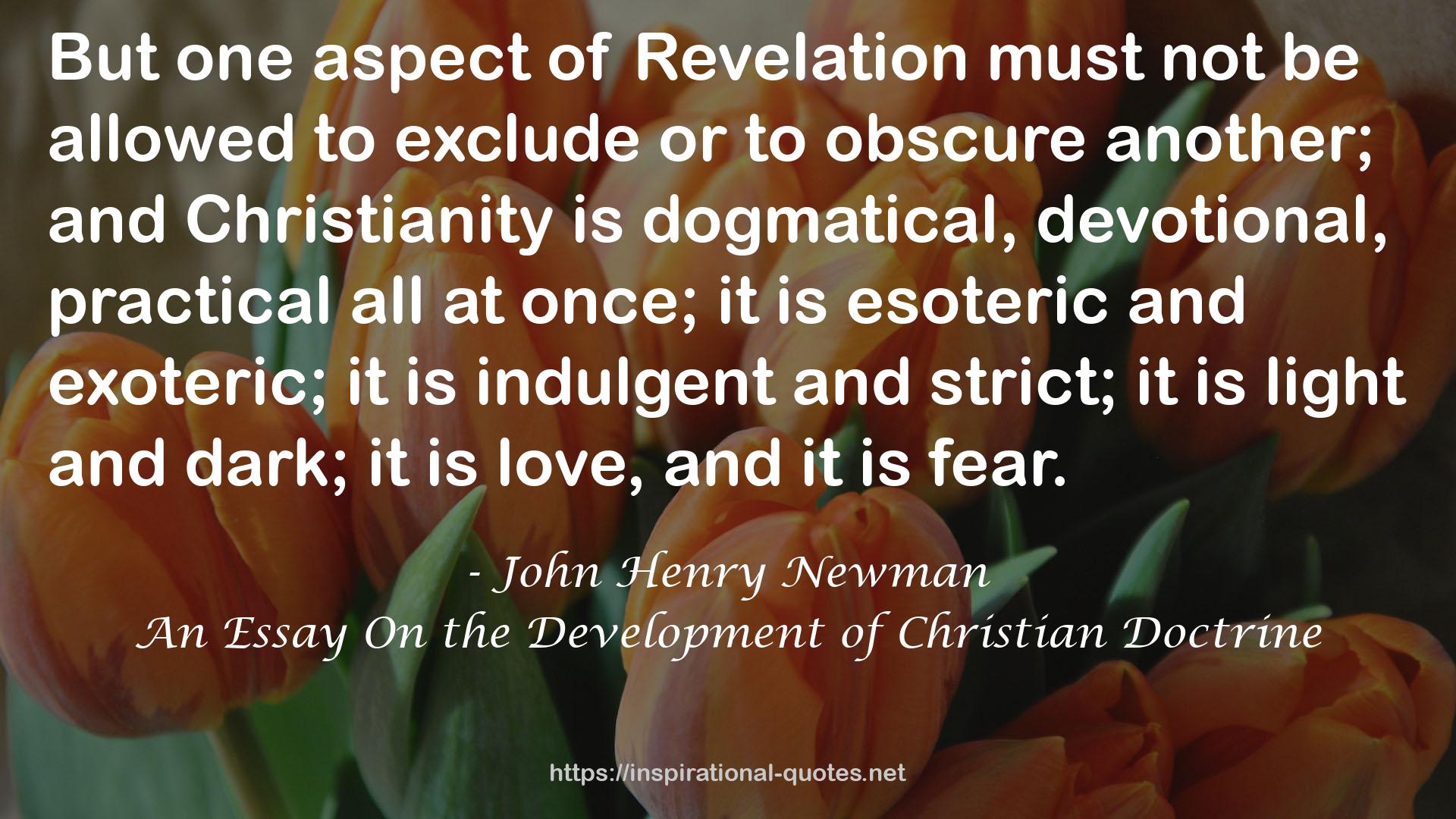5
" It is love which makes Christian fear differ from servile dread, and true faith differ from the faith of devils; yet in the beginning of the religious life, fear is the prominent evangelical grace, and love is but latent in fear, and has in course of time to be developed out of what seems its contradictory. Then, when it is developed, it takes that prominent place which fear held before, yet protecting not superseding it. Love is added, not fear removed, and the mind is but perfected in grace by what seems a revolution. "
― John Henry Newman , An Essay On the Development of Christian Doctrine
7
" That great portion of what is generally received as Christian truth is, in its rudiments or in its separate parts, to be found in heathen philosophies and religions. For instance, the doctrine of a Trinity is found both in the East and in the West; so is the ceremony of washing; so is the rite of sacrifice. The doctrine of the Divine Word is Platonic; the doctrine of the Incarnation is Indian; of a divine kingdom is Judaic; of Angels and demons is Magian; the connection of sin with the body is Gnostic; celibacy is known to Bonze and Talapoin; a sacerdotal order is Egyptian; the idea of a new birth is Chinese and Eleusinian; belief in sacramental virtue is Pythagorean; and honours to the dead are a polytheism. Such is the general nature of the fact before us; Mr. Milman argues from it,—'These things are in heathenism, therefore they are not Christian:' we, on the contrary, prefer to say, 'these things are in Christianity, therefore they are not heathen.' That is, we prefer to say, and we think that Scripture bears us out in saying, that from the beginning the Moral Governor of the world has scattered the seeds of truth far and wide over its extent; that these have variously taken root, and grown up as in the wilderness, wild plants indeed but living; and hence that, as the inferior animals have tokens of an immaterial principle in them, yet have not souls, so the philosophies and religions of men have their life in certain true ideas, though they are not directly divine. What man is amid the brute creation, such is the Church among the schools of the world; and as Adam gave names to the animals about him, so has the Church from the first looked round upon the earth, noting and visiting the doctrines she found there. "
― John Henry Newman , An Essay On the Development of Christian Doctrine
10
" In one point alone the heresies seem universally to have agreed,—in hatred to the Church. This might at that time be considered one of her surest and most obvious Notes. She was that body of which all sects, however divided among themselves, spoke ill; according to the prophecy, "If they have called the Master of the house Beelzebub, how much more them of His household." They disliked and they feared her; they did their charged matter to them, although they hold different doctrines, so long as they conspire together in their siege against the one thing, Truth." And even though active co-operation was impracticable, at least hard words cost nothing, and could express that common hatred at all seasons. Accordingly, by Montanists, Catholics were called "the carnal;" by Novatians, "the apostates;" by Valentinians, "the worldly;" by Manichees, "the simple;" by Aërians, "the ancient;" by Apollinarians, "the man-worshippers;" by Origenists, "the flesh-lovers," and "the slimy;" by the Nestorians, "Egyptians;" by Monophysites, the "Chalcedonians:" by Donatists, "the traitors," and "the sinners," and "servants of Antichrist;" and St. Peter's chair, "the seat of pestilence;" and by the Luciferians, the Church was called "a brothel," "the devil's harlot," and "synagogue of Satan:" so that it might be called a Note of the Church, as I have said, for the use of the most busy and the most ignorant, that she was on one side and all other bodies on the other.
There was one title of the Church of a very different nature from those which have been enumerated,—a title of honour, which all men agreed to give her,—and one which furnished a still more simple direction than such epithets of abuse to aid the busy and the ignorant in finding her, and which was used by the Fathers for that purpose. It was one which the sects could neither claim for themselves, nor hinder being enjoyed by its rightful owner, though, since it was the characteristic designation of the Church in the Creed, it seemed to surrender the whole controversy between the two parties engaged in it. Balaam could not keep from blessing the ancient people of God; and the whole world, heresies inclusive, were irresistibly constrained to call God's second election by its prophetical title of the "Catholic" Church. "
― John Henry Newman , An Essay On the Development of Christian Doctrine

